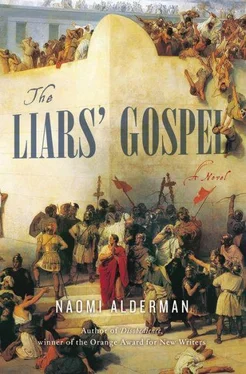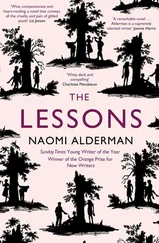Naomi Alderman
The Liars' Gospel
For my teachers. Especially those who taught me Latin and Hebrew: the gift of double vision.
In Breughel’s Icarus, for instance: how everything turns away
Quite leisurely from the disaster; the ploughman may
Have heard the splash, the forsaken cry,
But for him it was not an important failure.
“Musée des Beaux Arts,” W. H. Auden
THIS WAS HOW it happened.
It is important to quiet the lamb, that is the first thing. A young man, learning the skills of priesthood, sometimes approaches the task with brutality. But it must be done softly, even lovingly. Lambs are trusting creatures. Touch it on the forehead just above the spot between the eyes. Breathe slowly and evenly, close enough to the creature to inhale the meaty scent of wool. It will know if you are nervous. Hold yourself steady. Whisper the sacred words. Grasp the knife as you have practiced. Plunge the blade into the neck swiftly, just below the jaw. There must be no pausing. The knife must be sharp enough that almost no pressure is needed. Move it down evenly and quickly, severing the tendons and nerves as the blood begins to flow and the lamb’s muscles spasm. Withdraw. The entire motion should take less than the time of one in-breath.
Hold the lamb so that the blood gushes down, that it may be caught in the sacred cup. There is a great deal of blood; the life is in the blood. It is appropriate at this point to meditate on the blood in your own body, on how quickly and easily it could be released, on how one day it will cease to flow. Sacrifice is a meditation on vulnerability. Your blood is no redder than this creature’s. Your skin is no tougher. Your understanding of the events which will lead to your own death is probably no greater than this lamb’s comprehension.
The smell of it is strong: iron and salt and sharpness. A priest catches the blood in the cup. The cup becomes full. The priest scatters the blood, spatters it to the four corners of the altar. The smell increases. The lamb stops twitching. The last traces of life are gone from it. This is how quickly it happens. When the blood is drained, slice open the skin and pull it from the carcass. Now the creature is meat. Every living being is meat for another. Do you think that the mosquito — one of the smallest of God’s creatures — looks on us as anything other than food? Worms will one day devour you — do you imagine they will notice your intellect, your kindness, your riches, your beauty? Everything is eaten by some other thing. Do not think that because you have knives of bronze you are more than this lamb. All of us are lambs before the Almighty.
Remove the sacred organs from the flesh. Pull them, separating and cutting the sinews which hold them in place. Moments ago, they had purpose: like each man in the Temple, they had their functions to perform. Now they are objects to be burned in the holy fires. Take care not to pierce the bowel — the stench will be appalling. This is no ritual of the spirit, it is a matter of the body. Remember that your bowel too contains feces, that the woman whom you most desire in all the world is, at this moment as at all others, full of mucus and feces. Be humble. Remove the forbidden fats which may not be eaten: the sheet of fat across the abdomen, the fat of the kidneys.
Place the organs and the forbidden fats into the fire of the altar. As they burn, offer up praises to the Almighty, who has given us this holy duty, who has given us the wit to understand His works, who has placed us above the beasts in knowledge and in wisdom. As the fats burn, their outer membranes blackening, the soft white matter liquefying and dripping down among the burning branches, the smell will be sweet and delicious. These are the sweet savors for the Lord. Your mouth will begin to salivate, your stomach, if you have not eaten for some time, may begin to growl. You are not an angel, a disembodied spirit without desire. You are a body, like this lamb. You want to eat this flesh. You are a soul also, the more to praise your Creator. Remember what you are. Give thanks. When the fats and organs are consumed, the animal’s carcass may be removed. It will be cooked for you and your fellow priests. Thus you will share the meal with God.
This is the daily sacrifice. Every day, twice a day, morning and evening, a year-old lamb, healthy and without blemish. Every time, it is a sacred thing. Every time, the animal is slain for the glory of God, not for the mere satisfaction of our hungers. Every time, as the life bleeds out, the priest should look, and notice, and give thanks for the animal whose life has returned to its Creator and whose flesh provides sweet savors for the Lord and nourishment for His servants.
They knew it would be that day. It is impossible to follow the fortunes of a battle closely without knowing when they are reaching their conclusion. Especially when that battle concerns the city in which you live.
They had fought off the army as long as they were able. They had the advantage, to begin with: the walls were high, the ramparts thick. As the army worked below, filling the ravine with boulders and felled trees, they hurled down rocks and arrows upon them. They worked in shifts, night and day, pulling the matter out of the moat by the cellar doors as quickly as it was placed there. They struggled. But they were undone by God.
The Lord commanded them to rest on the holy Sabbath. On this day, the besieging enemy was able to gain ground. Week by week, Sabbath by Sabbath, cubit by cubit, the ravine was filled in. They worked double time, but it was not enough. The invading army worked harder. They saw that soon the ravine would be so full of debris that a platform could be erected on it, that ladders could be raised and battering rams employed.
On the day that the platforms went down, they knew the end was coming. They were not afraid: fear would be a long time coming still, they had not yet seen starvation leading to cannibalism, to murder, to infanticide. Instead of fear, they were angry. They occupied a land between the river and the sea; it was a necessary foothold for anyone hoping to hold this region. They happened to stand in the way. It seemed wrong to them that the world should operate in such a manner. They raised angry cries to the Lord.
In the Temple, the High Priest heard the battering ram pounding on the city wall night and day now. Each resounding bang did little damage by itself. A small amount of dust, perhaps a tiny shift in one of the stones. Accumulating, night and day, those cedars twice as thick as the arm span of a man would destroy the wall. The people could see the stones being bowed inward.
It was just before dawn when the first stone fell. It was towards the base of the wall, not quite at the bottom, and in the glittering early morning light the motes of dust around it seemed to shimmer as it tumbled, as it crashed to the ground. When it fell, there was a silence in the city. Outside, the soldiers whooped and shouted and redoubled their efforts. But for a moment, inside the city, there was only an astonished horror. They had known it must come and yet had not believed it until they saw. The impregnable wall was breached. Then there were cries. Bring men, bring fire, bring swords, keep the invaders back!
Inside the Temple, the young priests ran towards their master, crying out what they had heard. The High Priest watched them run, their robes flapping, their feet slipping on the blood-slick floor. He knew what they had come to tell him. Everyone in the city knew what it meant that the great banging had ceased. Were the sacrifices needed less now? Did the people no longer need to be brought close to God, to understand the shortness of their own lives?
Читать дальше












